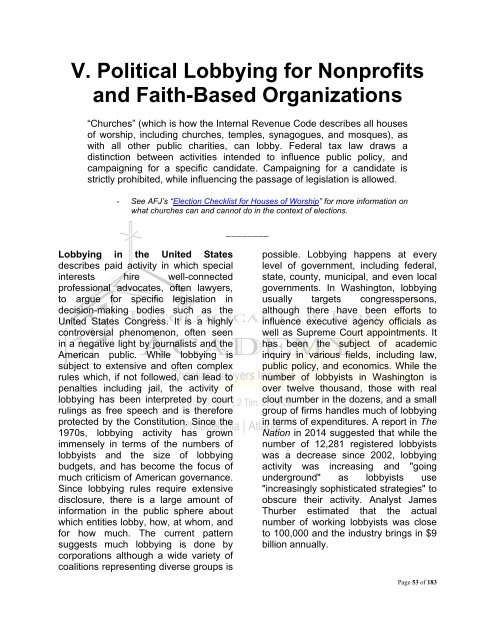The 508(c)(1)(a) Initiative Workshop
The 508(c)(1)(a) Initiative Workshop
The 508(c)(1)(a) Initiative Workshop
You also want an ePaper? Increase the reach of your titles
YUMPU automatically turns print PDFs into web optimized ePapers that Google loves.
V. Political Lobbying for Nonprofits<br />
and Faith-Based Organizations<br />
“Churches” (which is how the Internal Revenue Code describes all houses<br />
of worship, including churches, temples, synagogues, and mosques), as<br />
with all other public charities, can lobby. Federal tax law draws a<br />
distinction between activities intended to influence public policy, and<br />
campaigning for a specific candidate. Campaigning for a candidate is<br />
strictly prohibited, while influencing the passage of legislation is allowed.<br />
- See AFJ’s “Election Checklist for Houses of Worship” for more information on<br />
what churches can and cannot do in the context of elections.<br />
________<br />
Lobbying in the United States<br />
describes paid activity in which special<br />
interests hire well-connected<br />
professional advocates, often lawyers,<br />
to argue for specific legislation in<br />
decision-making bodies such as the<br />
United States Congress. It is a highly<br />
controversial phenomenon, often seen<br />
in a negative light by journalists and the<br />
American public. While lobbying is<br />
subject to extensive and often complex<br />
rules which, if not followed, can lead to<br />
penalties including jail, the activity of<br />
lobbying has been interpreted by court<br />
rulings as free speech and is therefore<br />
protected by the Constitution. Since the<br />
1970s, lobbying activity has grown<br />
immensely in terms of the numbers of<br />
lobbyists and the size of lobbying<br />
budgets, and has become the focus of<br />
much criticism of American governance.<br />
Since lobbying rules require extensive<br />
disclosure, there is a large amount of<br />
information in the public sphere about<br />
which entities lobby, how, at whom, and<br />
for how much. <strong>The</strong> current pattern<br />
suggests much lobbying is done by<br />
corporations although a wide variety of<br />
coalitions representing diverse groups is<br />
possible. Lobbying happens at every<br />
level of government, including federal,<br />
state, county, municipal, and even local<br />
governments. In Washington, lobbying<br />
usually targets congresspersons,<br />
although there have been efforts to<br />
influence executive agency officials as<br />
well as Supreme Court appointments. It<br />
has been the subject of academic<br />
inquiry in various fields, including law,<br />
public policy, and economics. While the<br />
number of lobbyists in Washington is<br />
over twelve thousand, those with real<br />
clout number in the dozens, and a small<br />
group of firms handles much of lobbying<br />
in terms of expenditures. A report in <strong>The</strong><br />
Nation in 2014 suggested that while the<br />
number of 12,281 registered lobbyists<br />
was a decrease since 2002, lobbying<br />
activity was increasing and "going<br />
underground" as lobbyists use<br />
"increasingly sophisticated strategies" to<br />
obscure their activity. Analyst James<br />
Thurber estimated that the actual<br />
number of working lobbyists was close<br />
to 100,000 and the industry brings in $9<br />
billion annually.<br />
Page 53 of 183
















